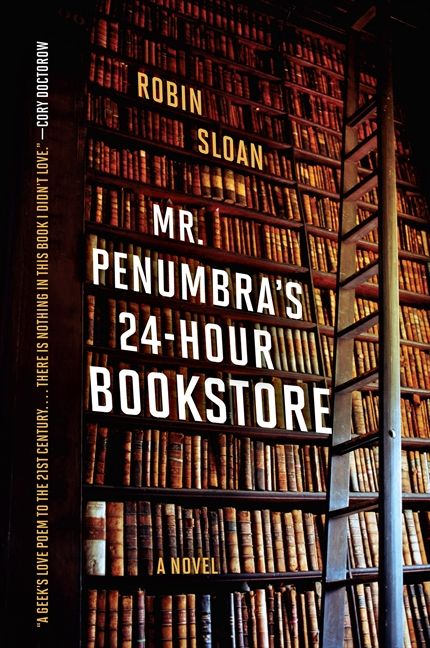A Reflective Revisit: Balancing Tech Optimism and Literary Nostalgia in 'Mr. Penumbra's 24-Hour Bookstore

"Mr. Penumbra's 24-Hour Bookstore" by Robin Sloan is an enchanting blend of old-world charm and futuristic technology, appealing to bibliophiles and tech enthusiasts alike. However, reading this book a full 12 years after its initial publication, our book club approached it with a lens shaped by more than a decade of technological evolution and its societal impacts, offering us a unique perspective on its themes.
At its core, the novel is a vibrant homage to the printed word, set against the backdrop of digital wizardry. It's a narrative that could be described as a 15-year-old hacker's wet dream, filled with secret societies, ancient codes, and the quest for immortality through the written word. The protagonist, Clay Jannon, transitions from unemployed web designer to a night clerk at a peculiar bookstore, tumbling into an adventure that threads through the realms of historical mystery and contemporary tech culture.
Sloan's narrative thrives on what can be dubbed "optimistic techbro futurism," a sentiment that resonates with a particular brand of Silicon Valley inhabitant. Despite the ultimate solution to the novel's main puzzle, the story is steeped in an optimism that views big tech's capabilities almost as a panacea, capable of solving the most cryptic puzzles humanity has to offer. While this perspective is compelling and captures the zeitgeist of the early 2010s, our group found it to be tinged with a certain naiveté, given the subsequent years' revelations about technology's double-edged sword.
This nearly-uncritical celebration of technology, which once felt visionary, now prompts a more skeptical analysis. The book's portrayal of tech solutions as largely benevolent and infallible reflects a prelapsarian optimism that, in the cold light of the 2020s, seems at odds with the complex realities of data privacy issues, misinformation, and the digital divide. The narrative's alignment with "techno-optimist bro" culture, while engaging, now strikes a discordant note, highlighting a certain myopia regarding the broader implications of technological ubiquity.
Despite these reflections, the novel undeniably sparks intriguing discussions about the longevity of books and the interplay between digital and physical media. Sloan skillfully uses the story to ponder how books can last a thousand years and what that means in an era of ephemeral digital content. The book is a celebration of the tactile and the tangible, yet it's imbued with a sense of wonder at the digital world's possibilities.
However, our club felt that the book could have greatly benefited from an additional hundred pages dedicated to deeper character development. The potential for richer backstories and more nuanced motivations is evident, and such expansion could have provided a stronger emotional anchor to the narrative's philosophical musings and technological explorations.
Reflecting on "Mr. Penumbra's 24-Hour Bookstore" from our current standpoint also meant engaging critically with the book's once-unquestioned optimism about companies like Google. The narrative's almost reverential attitude towards Google's capabilities and its implicit endorsement of a tech-centric future now prompts a more nuanced, critical reflection, considering the subsequent decade's tech-lash and growing awareness of digital culture's pitfalls.
In conclusion, "Mr. Penumbra's 24-Hour Bookstore" remains a captivating narrative that eloquently bridges the gap between the printed page and the pixelated screen. Its celebration of the book as an artifact and its enthusiastic embrace of technological innovation are infectious. Yet, when viewed through the prism of the ensuing years, the novel also serves as a poignant reminder of the tech industry's once unchecked optimism. It stands as a testament to a time when the future seemed uncomplicatedly bright, offering our book club a rich tapestry for discussion, not just about the content, but also about the context in which we revisit this engaging story.
This review was written with the aide of GPT-4 -
